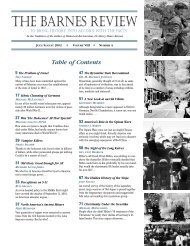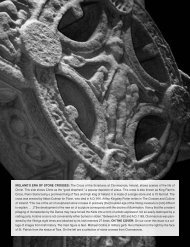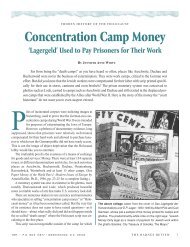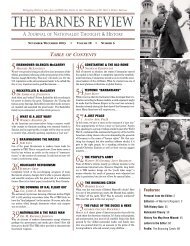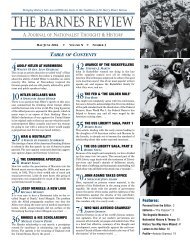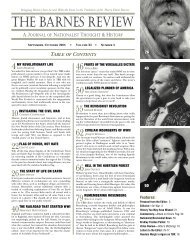You also want an ePaper? Increase the reach of your titles
YUMPU automatically turns print PDFs into web optimized ePapers that Google loves.
PAGE 12 the barnes review MAY/JUNE<br />
the writings of saints John Chrysostom,<br />
Basil the Great and Ephrem the Syrian. As<br />
the West sank into near annihilation during<br />
the dark ages after the fall of the western<br />
Roman Empire, Byzantium maintained<br />
the standard of Greco-Roman civilization,<br />
preserving it for ages to come. <strong>The</strong><br />
poverty of Europe would have been im -<br />
measurable without her.<br />
John Julius Norwich’s book, A Short<br />
History of Byzantium, which is actually an<br />
abridgment of an earlier three-volume ser -<br />
ies, is a dense journalistic account of this<br />
most complex of historical subjects. This is<br />
its greatest weakness, that is, it treats<br />
Byzantine history as a mere chronicle, a<br />
meaningless series of events, rather than a<br />
series of concepts that come to define a civilization.<br />
Journalistic history is mere raw<br />
data; it is necessary, but does not stand by<br />
itself when dealing with the nature of such<br />
a great civilization. Raw data needs conceptualization<br />
as concepts need data if<br />
either is to make sense. <strong>The</strong> events of any<br />
specific civilization need to be conceptualized<br />
before they speak to us.<br />
History is meant to be written conceptually.<br />
That is, historical data is meant to be<br />
interpreted so as to communicate an accurate<br />
picture of the nature and essence of<br />
the historical topic at hand. To merely<br />
claim that Emperor x succeeded Emperor y<br />
and z engaged q in battle on such-and-such<br />
date is to tell us nothing; it is to give us<br />
data without the necessary conceptual<br />
apparatus to provide knowledge, interpretation<br />
and individual reflection. <strong>The</strong> conceptual<br />
apparatus, or the self images<br />
Byzantium had maintained and communicated<br />
to the world, is necessary to make<br />
sense out of issues of succession, military<br />
exploits or palace intrigue. Otherwise these<br />
are entertaining soap operas only.<br />
Historical events, for the historian at -<br />
tempt ing to take the ancient and medieval<br />
world and make it intelligible to modern<br />
readers, do not occur in a conceptual vacuum.<br />
Concepts inform individual actions as<br />
individual actions continue to inform the<br />
conceptual apparatus. In other words, a<br />
national or civilizational identity actually<br />
exists and forms the actions of individuals<br />
living under its sway. Without the former,<br />
the latter seems to decay into a series of<br />
random events.<br />
Every society that has existed has had<br />
its military victories and defeats, its brilliant<br />
and depraved rulers, its arts and letters,<br />
its ebbs and flows. To simply repeat<br />
this historical reality in a journalistic<br />
account of abstract events leads one to the<br />
height of boredom that has, as in high<br />
school history texts, driven thousands<br />
away from an interest in history. What<br />
Adam on the left and, believe it or not, Eve on the right work in a cereal field<br />
after their expulsion from the Garden of Eden. This is a fine example of a<br />
Byzantine ivory plaque from the 11th or 12th century.<br />
makes history interesting is that these<br />
events, all over the globe, at all times,<br />
reflect a certain national or civilizational<br />
ethos in a unique way and had a unique<br />
effect on a people. Can one visualize a history<br />
text on the American Founding<br />
Fathers that tells of their legal, merchant<br />
or farming careers, their incomes and<br />
wives, their children and education, their<br />
personalities and habits, but refuses to<br />
deal with their own self-images: their ideas<br />
of liberty, self-determination, order, religion;<br />
their ideas of rights, duties, and civic<br />
responsibilities? Such is the difficulty with<br />
Norwich’s book.<br />
Areason for the dominance of the journalistic<br />
style in history is the everpernicious<br />
influence of modernization theory<br />
in politics. In short, this theory, utterly<br />
dominant within the Anglo-American es -<br />
tab lishment in historiography, as well as<br />
economic and political writing, is that societies<br />
reflect merely a universal history:<br />
<strong>The</strong>y evolve from primitive forms of status,<br />
hierarchy and custom, into a rational meritocracy<br />
based around free contract and a<br />
rationalized bureaucracy. Civilizations and<br />
nations are thus judged to be in some stage<br />
along this continuum, with the “history” of<br />
each being nothing more than a chronicle<br />
of this evolution. As terribly smug as this<br />
dominant idea, or meta-idea, is, it almost<br />
completely controls, often subconsciously,<br />
writing on history and politics in our age.<br />
Thus, traditionalists are “reactionaries”<br />
due to the a priori impossibility of stopping<br />
the “inevitable march of history.” History<br />
itself is saturated with normative meaning,<br />
according to this Modernization school, and<br />
the very passing of years (apart from<br />
exogenous factors) necessarily means the<br />
liberalizing of the society. Political events,<br />
then, are merely recounted as either following<br />
the foreordained pattern of human<br />
development or, through some anomaly,<br />
being in the grip of reactionaries and irrationalists<br />
(for a horrific and archetypal<br />
example of such ideological historicizing,<br />
see James Billington’s <strong>The</strong> Icon and the<br />
Axe: An Interpretive History of Russian<br />
Culture. But certainly, the examples could<br />
be multiplied. On the other hand, for a<br />
counterexample to such nonsense, see<br />
Baron and Kollman’s Religion and Culture<br />
in Early Modern Russia and Ukraine).<br />
<strong>The</strong> domination of modernization theory<br />
and the journalistic history it engenders in<br />
Western societies has not had a small effect<br />
on historical analysis. As individuals lose<br />
any sense of themselves, as they become<br />
more alienated from their own civilization,<br />
religion, race, ethnicity, cultural and na -



